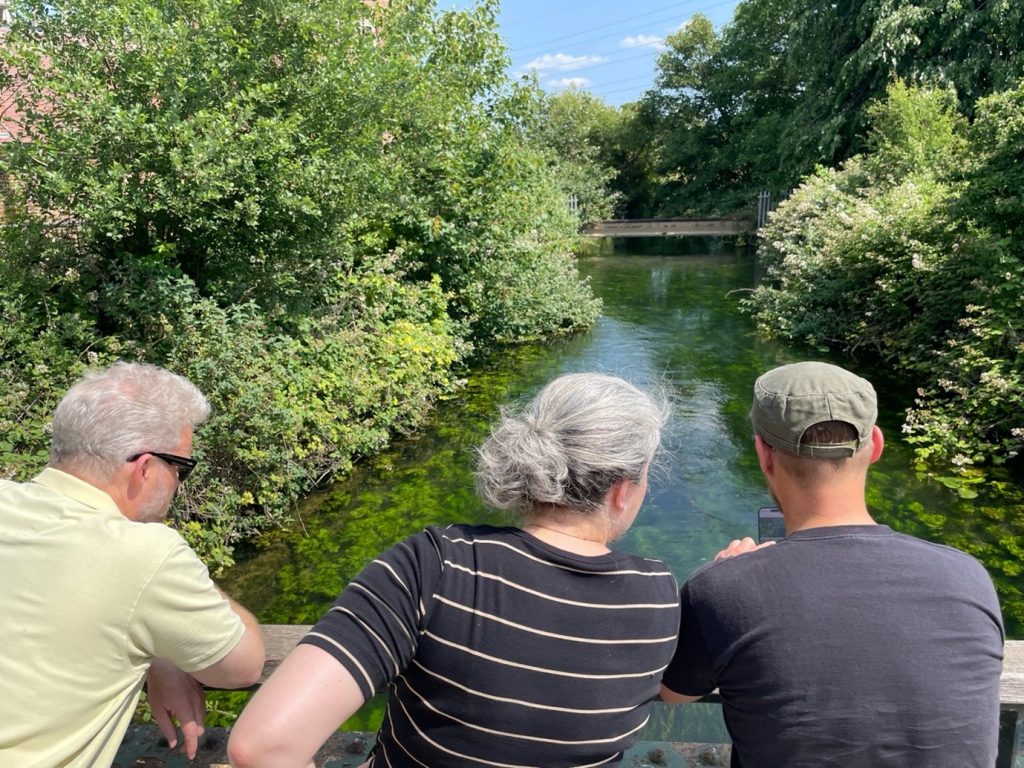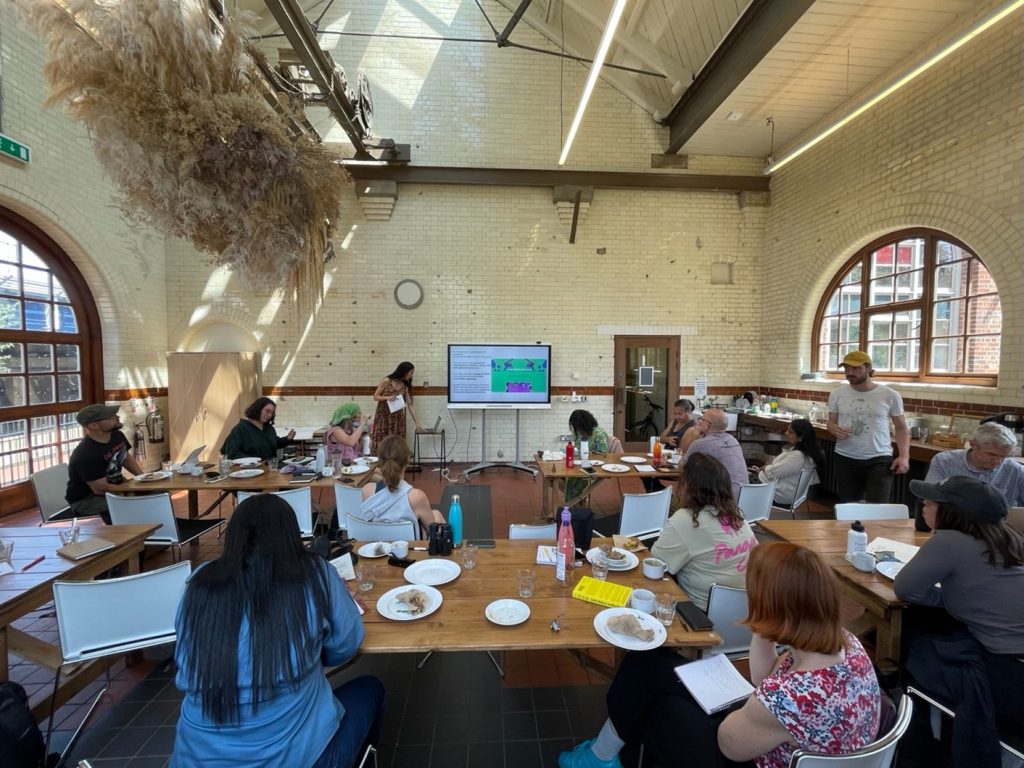Climate and Ecological Transitions Hub Away Day: Reflections from the Wetlands
Friday, 13 June 2025
On Friday 13 June, the Climate and Ecological Transitions (CET) Research Hub at Loughborough University London held its first away day. The day began with an early morning bird walk led by Gerhard Shnyder. Equipped with binoculars, the group departed from Here East in Hackney Wick and traced the meandering path of the River Lea through Hackney, Leyton, eventually arriving at Walthamstow Wetlands, Europe’s largest urban wetlands reserve. Along the way, we observed nearly 40 bird species, from flashes of goldfinches to cormorants sunning their wings, graceful swoops of terns overhead, and even a sighting of a great spotted woodpecker swaying in the treetops.

Our walk ended at the beautifully restored Victorian-era Engine House, formerly the Ferry Lane Pumping Station. Designed by architect H. Tooley in 1894, the building now houses the Wetlands Visitor Centre. It provided an inspiring setting for a day of engaging presentations from keynote speakers Rachel Sweeney, formerly programme lead of the MA in Movement, Mind and Ecology at Schumacher College, Kayleigh Walsh of Outlandish Co-op, and doctoral researcher Nicos Moushouttas.
Rachel started the day with a provocative talk on her involvement with Schumacher College, a transdisciplinary Institute that pioneered holistic ecological education from 1991 until 2024. Advocating for indigenous knowledge systems as a foundation for rethinking educational responses to the ecological crisis, Rachel guided participants through a mindfulness exercise followed by an outdoor exploration. We were each tasked with identifying a local species of flora or fauna and tracing its origins: Where did it come from? What names has it held? How long has it been here? Prompting conversations about movement, rootedness, and memory.
Rachel’s presentation provoked a rich discussion on the structural and creative tensions that shape transdisciplinary education. Participants reflected on how institutional systems often entrench disciplinary boundaries, limiting integrated approaches to learning and research. In response, Sharon Prendeville and Gerhard Shnyder highlighted the role of physical space in reinforcing these silos, noting how the very architecture of educational buildings can shape how knowledge is exchanged and sustained. This sparked a broader call to reimagine learning environments, not just as containers for teaching, but as active agents in enabling cross-disciplinary collaboration.
Building on these themes, Ana Cristina Suzina offered a provocation drawn from her work with Indigenous communities. She described how formal education is often perceived as an “exodus system”, drawing students away from their communities and positioning success as something externally defined. She challenged the group to consider how research and pedagogy might instead root learning within communities, reversing this dynamic.
After lunch, Doctoral Researcher Nicos Moushouttas presented his exploratory research, funded by the CET Hub, on the environmental consequences of globalisation. He offered a critical lens on how global economic systems accelerate ecological degradation and proposed four interlinked concepts: protectionism, degrowth, bioregionalism, and community wealth building, as alternative pathways for just and sustainable futures.

This was followed by a presentation from Kayleigh Walsh on Outlandish Co-op’s Un-Edge project. The initiative supports communities to co-create knowledge and tools for fair governance, alternative economic models, and ecological resilience. At its heart, Un-Edge seeks to dismantle extractive systems by facilitating shared learning and enabling community-led transitions grounded in care, solidarity, and democratic practice.
In the afternoon, Kanchana Minson and Adam Warren from RIO led an interactive workshop exploring the tensions between academia and practice. Through a series of reflective prompts, participants split into groups and considered how to build trust across sectors, dissolve boundaries, and co-develop more equitable and enduring collaborations.
In one group, a central question emerged: How can we create knowledge commons between researchers and practitioners? The session surfaced critical reflections on the extractive tendencies of academic knowledge production, where practitioners are sometimes positioned as subjects rather than co-authors. The group discussed how both communities share a desire to generate meaningful knowledge, however the academic system may often unintentionally prioritise publishing economies over relational reciprocity, marginalising the contributions of those outside formal research environments.
Attending practitioners questioned the extractive tendencies of research relationships, noting that practitioners often contribute valuable insights, labour, and contextual knowledge, yet may receive limited recognition or long-term engagement in return. This raised important provocations: What new value frameworks might enable more reciprocal, co-owned approaches to knowledge production? How can we design mechanisms that sustain relationships with community and organisational partners over time, not just for the duration of a project, but as a continued practice of mutual trust and accountability? These questions remain urgent for those working at the intersection of academia and practice, and the session underscored the need to reimagine not only the methods of collaboration, but also the infrastructures that support just and enduring knowledge exchange.
With these reflections in mind, the group made their way to the nearby Ferry Boat Inn. There, conversations continued in a more relaxed setting, as we gathered by the riverside to unwind and soak up the last of the afternoon sun, a fitting close to a day grounded in thoughtful exchange and collective learning.
Special thanks go to Ana Cristina Suzina, Sharon Prendeville, and Gerhard Shnyder for organising such a thoughtful and inspiring event. Gratitude also goes to our keynote speakers: Rachel Sweeney, Nicos Moushouttas, and Kayleigh Walsh, for their insightful contributions, and to Kanchana Minson and Adam Warren for their engaging workshop. Finally, thank you to all who attended and contributed to the rich and meaningful conversations that unfolded throughout the day.
Written by Finn Livingstone
Loughborough University London
Blogging everything that’s happening at Loughborough University London